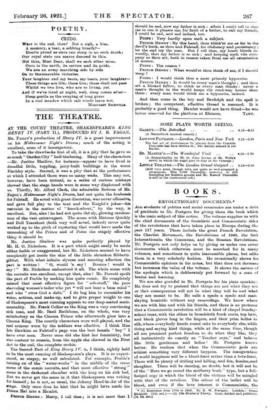THE THEATRE.
AT TAR COURT THEATRE, SHAKESPEARE'S KING HENRY 7V. (PART IL), PRODUCE-D BY J. B. FAGAN. Mn. FAGAN'S production of &ley IV. is a great improvement on his Midsummer Night's Dream ; much of the acting is excellent, none of it IneoMpeteht.
To take the drawbacks first of all, it is a pity that he. gave' us so much " Garden City " half-timbering. Many of thecheracters —Mr. Justice shallow, for instance---appear to -have -lived in dreadful little, toppling, jerry-built buildings in the -worst Finchley style. Second, it was a .pity that at the performance at which I attended there were -so many waits. This may not, however, have been normal, as a series of -curious mishaps showed that the stage hands were in some way displeased with us. Thirdly, Mr. Alfred Clark, the admirable Bottom of Mr. Fagan's Midsummer Night's Dream, had not quite the bonhomie for Falstaff. He acted with-great discretion, was never Offensive, and gave .fall play to the text and the Knight's jokes—his restraint in the matter of " knock-about," by the way, is excellent. But, alas I he-had not quite the sly, glowing careless- ness of the vast extravagant. -The scene with Mistress Quickly and Doll Tearsheet (both very well acted, indeed) never quite worked up to the pitch of roystering that would have made the unmasking of the Prince and of Points the stagely effective thing it should be. Mr. Justice Shallow was quite perfectly played by Mr. H. 0. Nicholson. It is a part which might easily be made either-feeble or exaggerated, but Mr. Nicholson seemed to have oompletely.got inside the skin of the little shrunken flibberti- gibbet. With what infinite Slyness and sneering affection the part is written ! " 0, would ?a. say Bounce ! would 'a say ! " Mr. Nicholson understood it alL The whole scene with the recruits was excellent, except that, alas ! Mr. Perrott spoilt the part of- Feeble by making him -quite comic. He completely missed that most effective figure for " sob-stuff," the poor starveling woman's tailor who yet "will not bear a base mind" and who " owes .God a debt." I do beg -him to reoonsider his Voice, actions, and make-up, and to give proper weight to one of Shakespeare's moat cunning appeals to our deep-seated senti- mentality. Mr. Frank Collier as the King was a very convincing sick man, and Mr. Basil Rathbone, on the whole, was Very satisfactory as the Cinema Prince who afterwards grew into a Cinema King. The courtly characters were well played, and the real armour Worn by the soldiers was effective. I think Miss Iris Hawkins- as Falstaff's -page was the best female " boy " I have ever seen. Never .once did she hint her femininity, but was content to remain, from the apple she chewed in the -First Act to the end, the,complete The Second Part of King Henry IV. is, I think, rightly held to be the most cunning of Shakespeare's plays. It is so experi- enced, so stagey, so well calculated. For example, Feeble's turning on of the " water-works f' in -the middle -of the revue scene of the comic recruits, and that most effective " strong " scene in the- darkened chamber with the king on -his sick bed. But we never get the sense in it that Shakespeare was writing for himself_; he is not, as usual, the Johnny-Head:in-Air-of the Stage. Only once does lie hint that he laight MVO blade his Prince Hal into a :Hamlet.
Panics Hansa ; Marry, I tell thee ; it is not meet that I should be sad, now my father is at*: -albeit I could tell to thee as to one it pleases me, for fault of a better, to call my friend), I could be sad, and sad indeed, too.
RUSS : Very hardly upon such a subject.
Panto:el Trimeav By this hand, thou think at me as far in the devil's book, as thou and Falstaff, for obduraoy and persistency ; let the end try the man. But I tell thee, my heart bleeds in- wardly, that my father is so sick ; 'and keeping such vile com- pany as thou art, "lath in mason taken from me all alter-it:Woe
of sortew.
Pomo : The reason ?
Pauses HENRY : What would'et thou think of me, if I should
weep ?
POEMS : I would think thee a most princely hypocrite. PRINCE HENRY : It would be every man's thought ; arid thou art a blessed fellow, to think as every man thinks : never a man's thought in the 'world keeps the road-way better than them every -man would think me a hypocrite, indeed.
And then Crane in the boy -and Bardolph and the spell is broken ; the competent, effective thread is resumed. It is probably a good thing. Hamlet would not have fitted—he was better reserved for the 'platform at Elsinore. TARN.


































 Previous page
Previous page